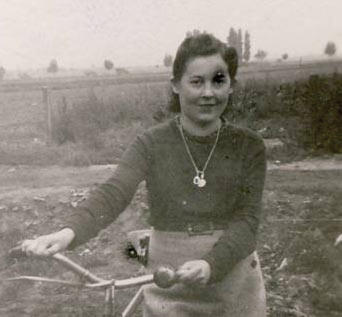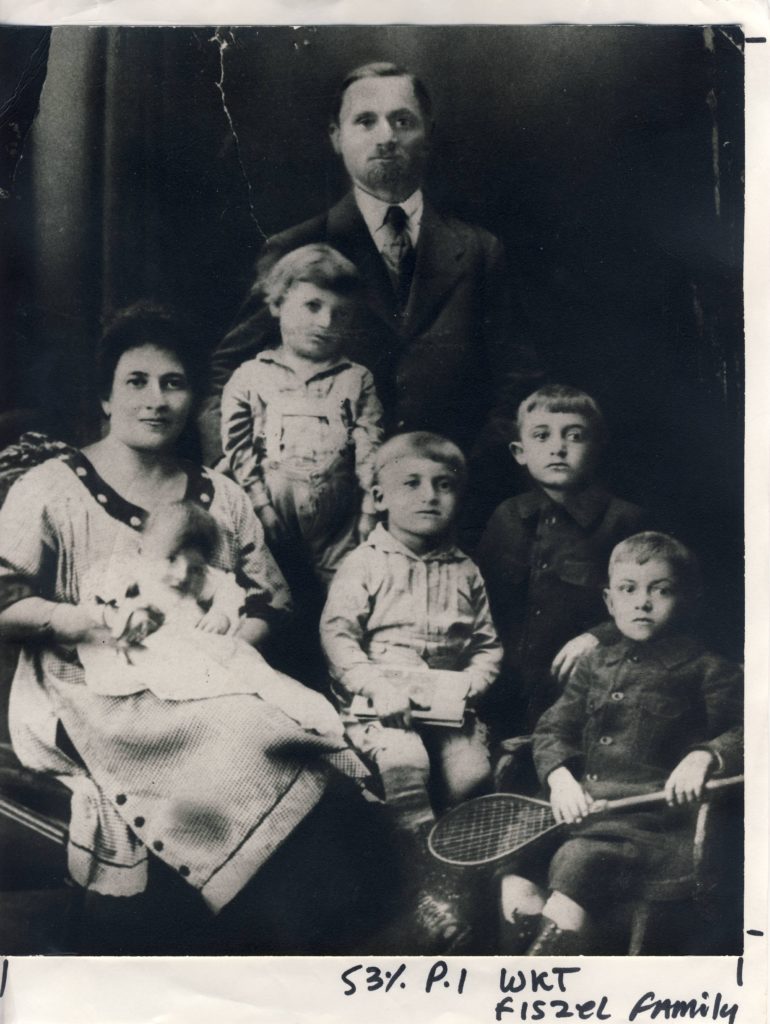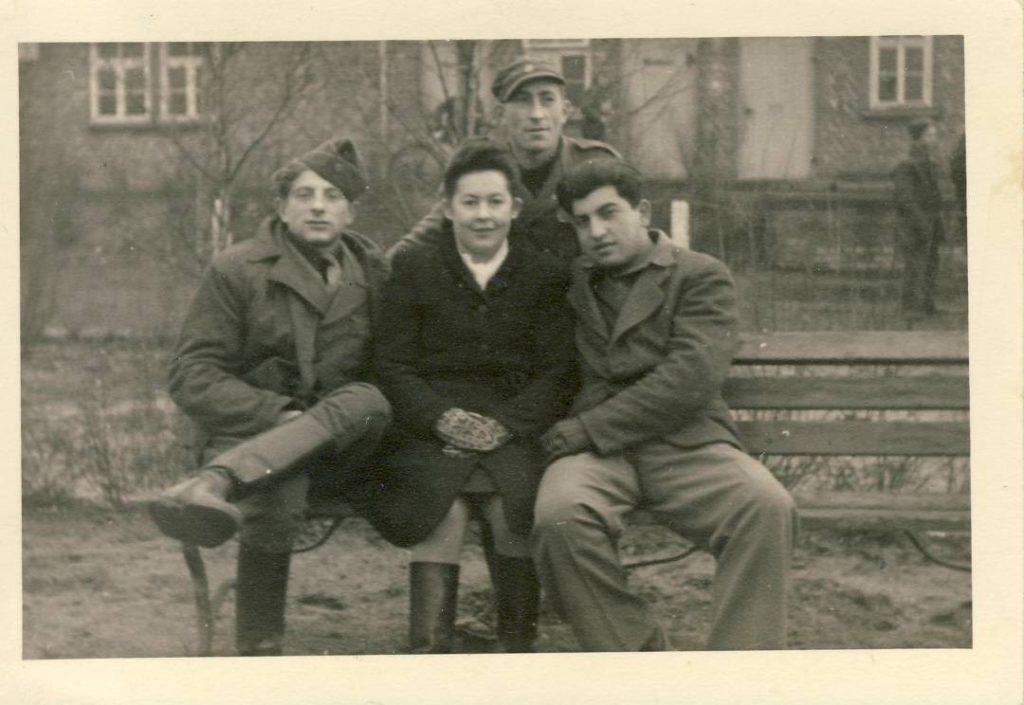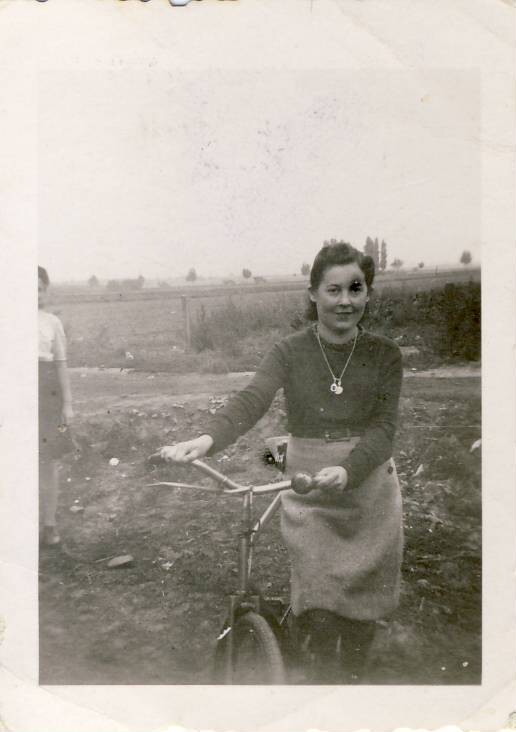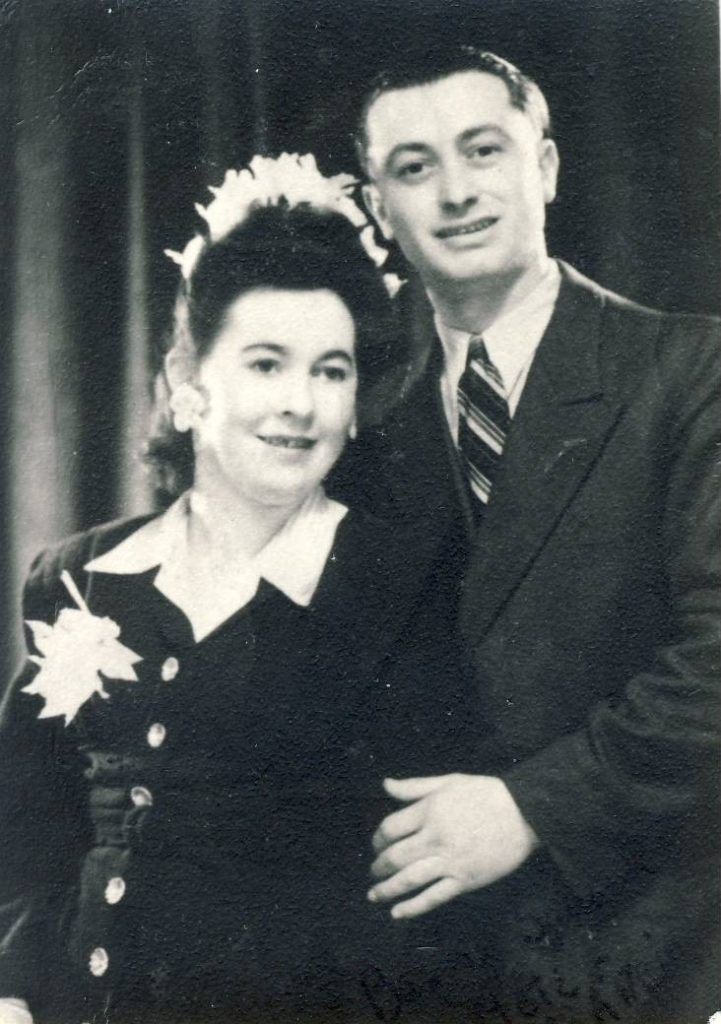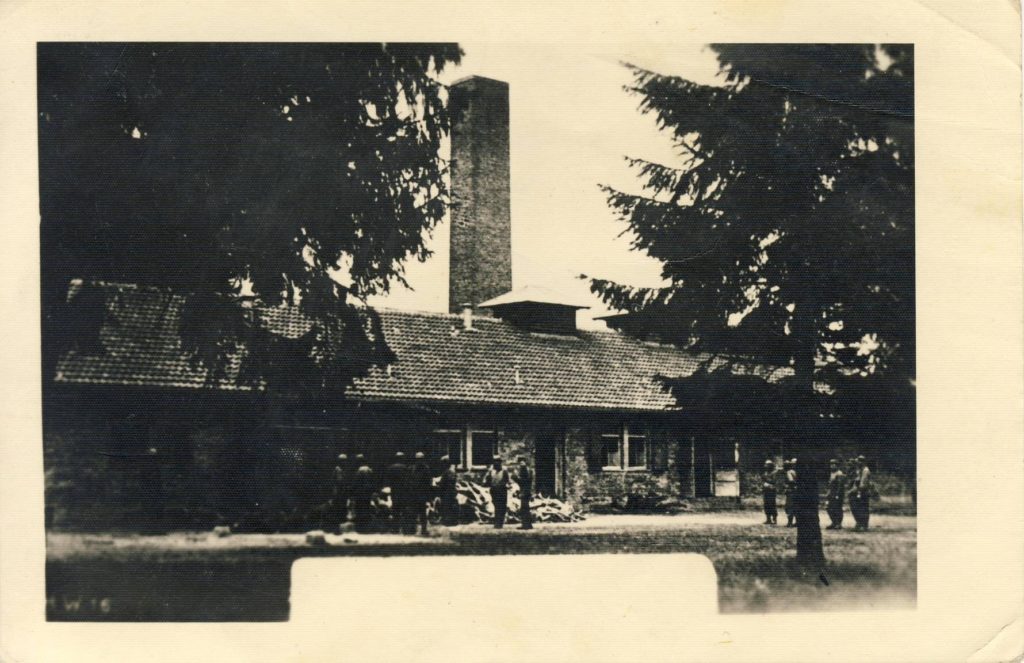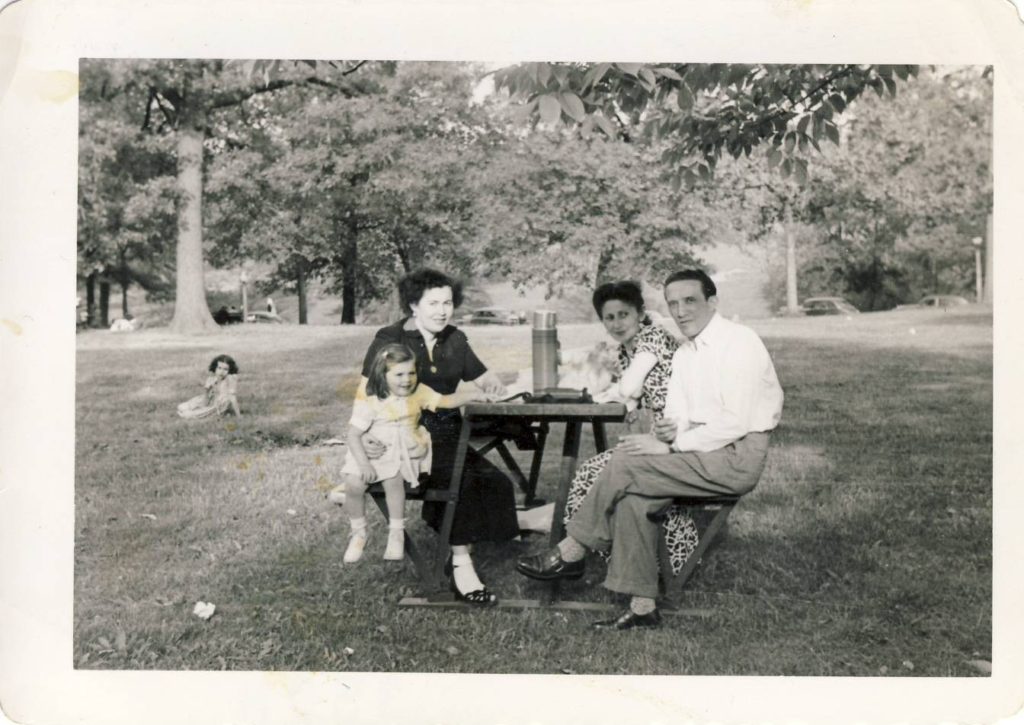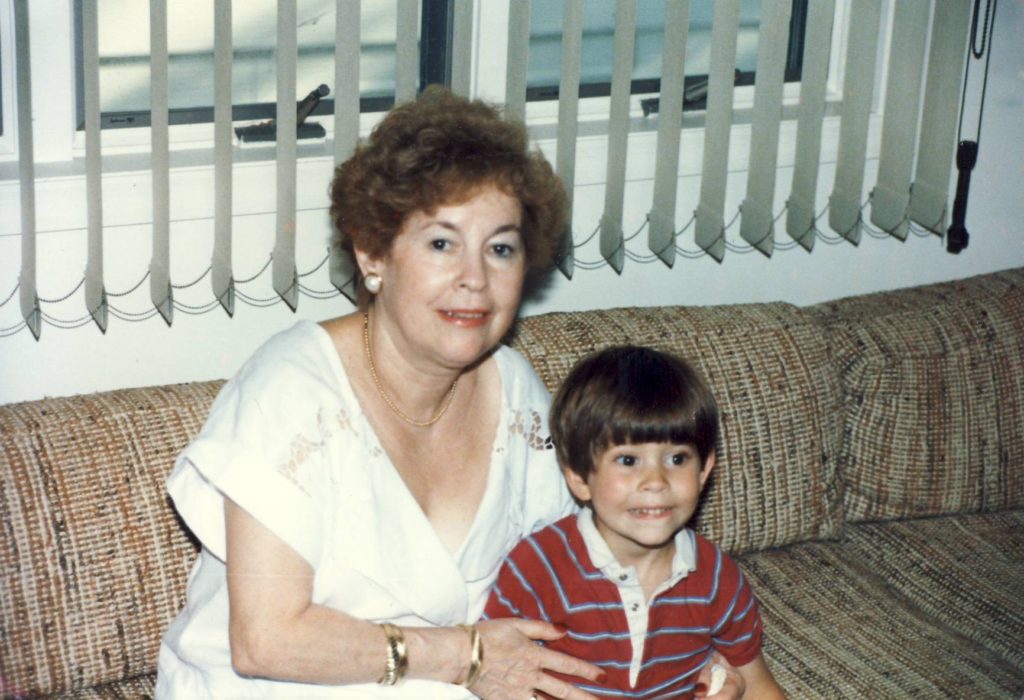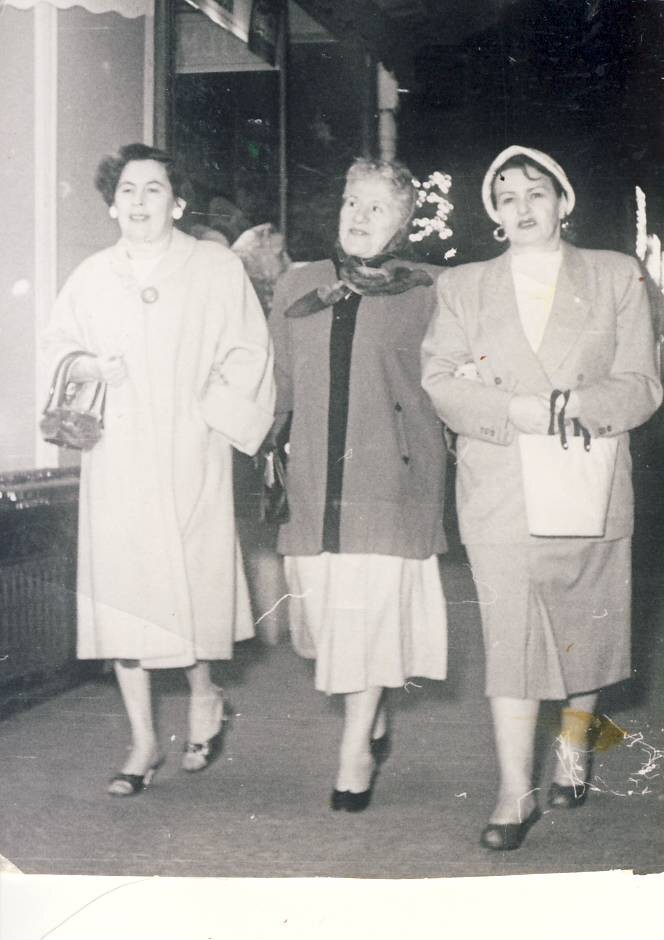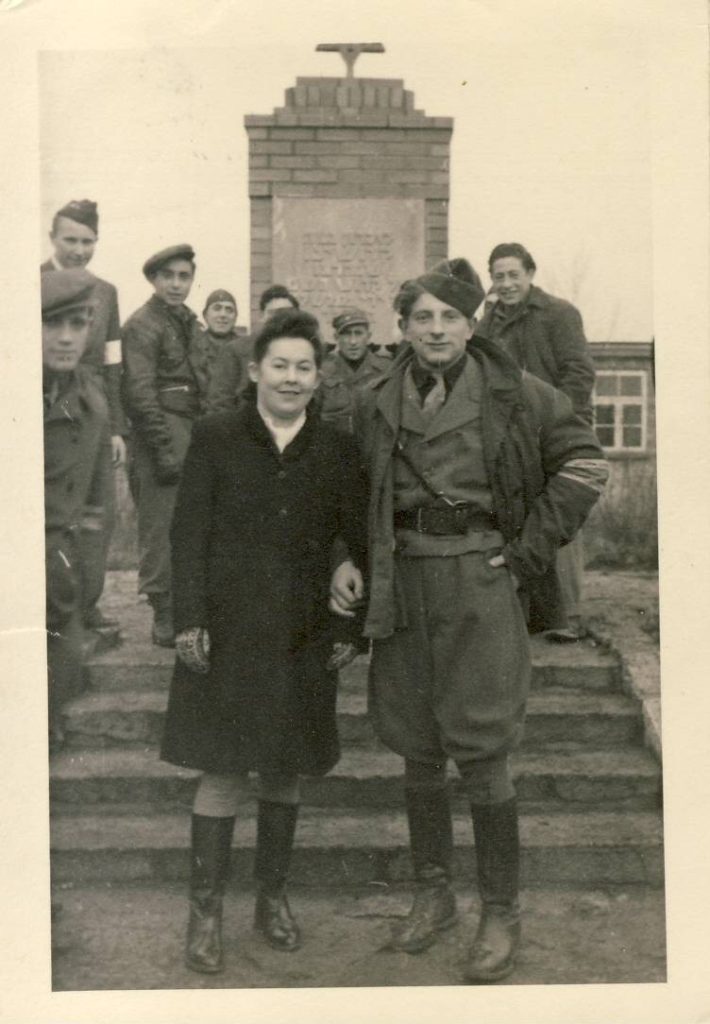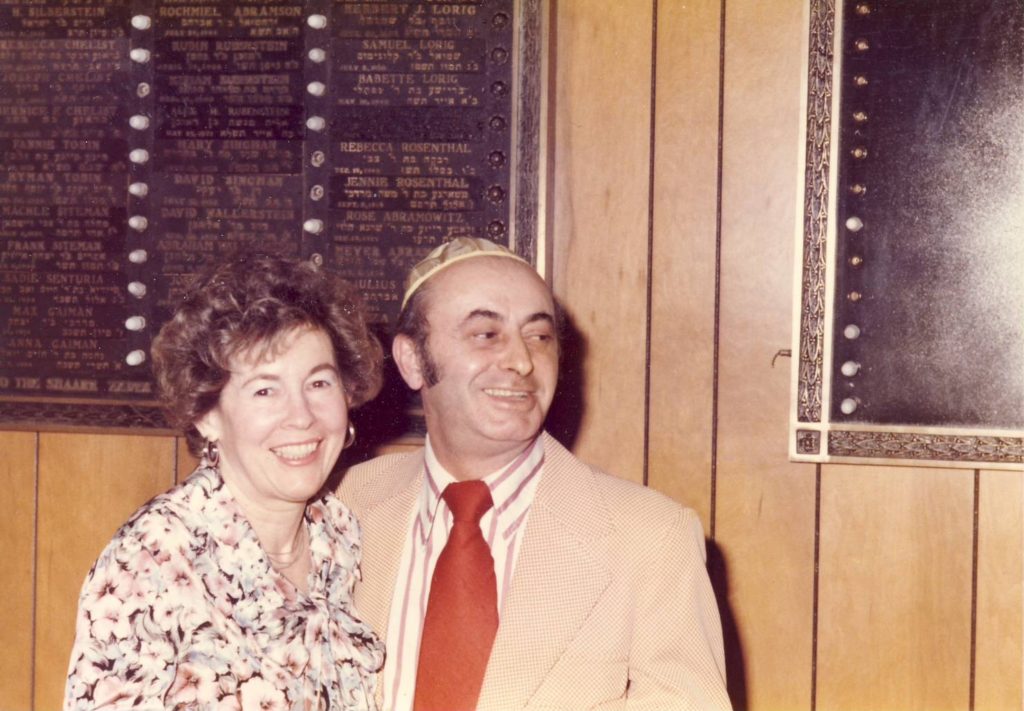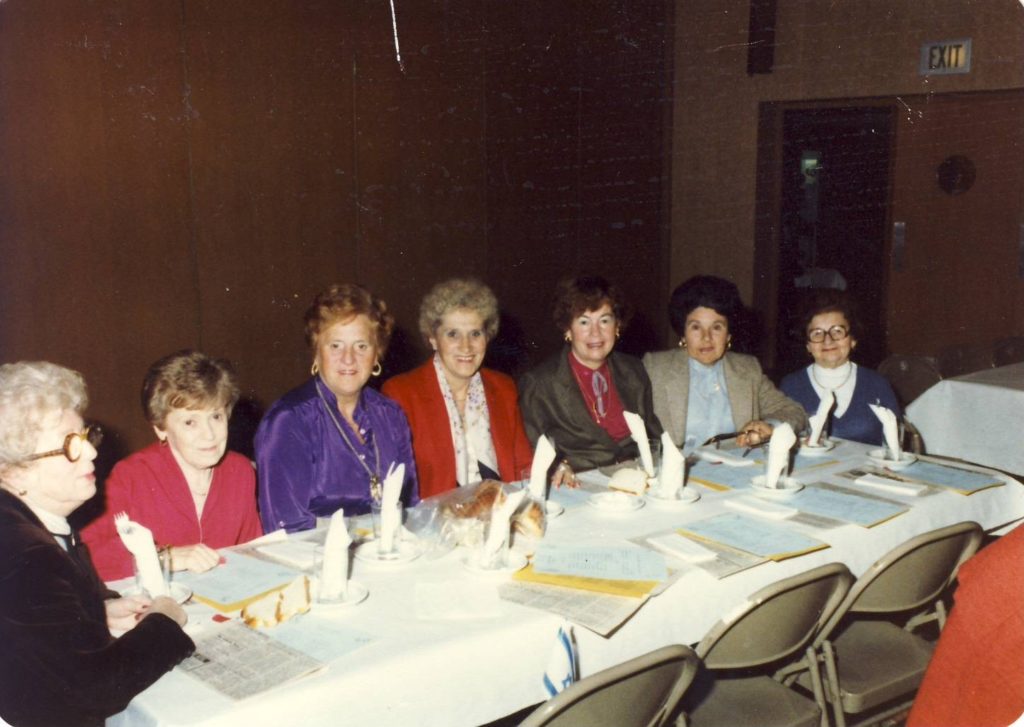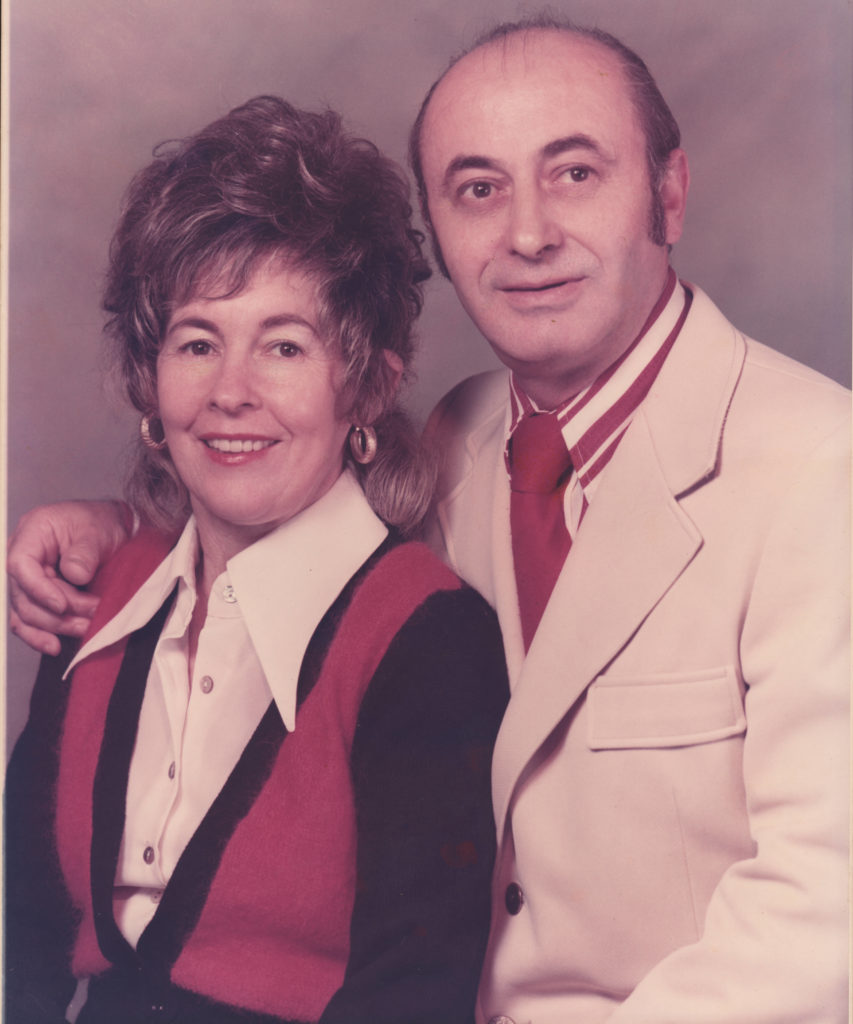Fiszel: What are we going to talk about today?
Burde: Well, was there anything after we spoke the last time that you particularly wanted to talk about? …Was there anything you felt we hadn’t covered, or…?
Fiszel: My mind is so blank. [LAUGHS]. A lot of things to talk about…what should we talk about…you want to know…?
Burde: I’m a little bit confused about the dates. You went into the ghetto…
Fiszel: In 1939…
Burde: Shortly after…
Fiszel: In January 1940.
Burde: In January 1940. And how long were you there?
Fiszel: Until 1944, in August.
Burde: Do you remember the day that you moved into the ghetto?
Fiszel: The day?
Burde: Yeah.
Fiszel: What day it was?
Burde: It was cold, was it…?
Fiszel: Very cold, it was in January.
Burde: And did you have to carry things yourself?
Fiszel: We had a little bit of luggage.
Burde: And did you walk, or…?
Fiszel: Well, yeah…
Burde: There weren’t any carts or vehicles? You just had to walk with what you could carry?
Fiszel: With what you could carry, yeah.
Burde: So that must’ve been hard because…
Fiszel: Very hard…
Burde: You had to carry pots and pans and…
Fiszel: In Europe we didn’t have all of the stuff we have here… We had very little to begin with, and then the pogroms, it’s not the United States so I didn’t have that much. With four children, if we had a little bit to eat and a piece of clothes, well then we were very good.
Burde: So you could pretty much take what you had because you had so little?
Fiszel: Yes, we lived in one bedroom apartment with four children.
Burde: Before the war?
Fiszel: Before the war.
Burde: And smaller quarters later?
Fiszel: Yes. Then we had one room only for six…it got to be less and less. There were six people in one room.
Burde: Di d you have bathroom facilities or water?
Fiszel: No, outside.
Burde: Where did your mother cook?
Fiszel: We had a stove—not electric, not, uh…on coal. We had a, I mean to cook, we cooked inside on coal, but the bathrooms were outside.
Burde: And was it a big apartment building?
Fiszel: It was, they had big apartment buildings too, not as big as here, but they had, yes. We lived in not such a big one, it was three floors.
Burde: But there were a lot of people living in…?
Fiszel: Yes. We lived outskirts from the main city, and there was a little section of Jewish people.
Burde: You mean before the war, before the ghetto?
Fiszel: Yeah.
Burde: But when you went into the ghetto…
Fiszel: In the ghetto, then, this was the main corridor for the Jewish people, then it was the lowest, lowest…
Burde: Income?
Fiszel: Lowest category of people, too. How do you say, you know….?
Burde: They didn’t have much.
Fiszel: Not beside that, but, not educated, and lower trades. I mean, they were violent, they were not good for ch—you know, the people.
Burde: But when the Germans forced all the Jews in Lodz to go into the ghetto, then all the Jews were together.
Fiszel: All the Jews were together, no ___?___. There were no ___?___. They were all the same. No bad, no good—I mean the bad ones started to take care of the people that they thought they would survive by doing things to them.
Burde: So that they immediately knew how to use the situation?
Fiszel: Yes, yes. And they switched on a lot of people. They thought, you know, by telling them about another story to survivors, but it didn’t work out. They survived maybe longer, till the end. But a lot of survived by luck like I did, and others but not survive—they didn’t survive because they came and told them that they did a lot of good work for them. No, they didn’t. That’s the difference, that people were, you know, afraid of some Jewish people.
Burde: And they also knew the ghetto because they lived there?
Fiszel: They lived there, yeah.
Burde: So they knew their way around.
Fiszel: Yeah, a lot of people lived there. And they took us like we went to the ghetto so they destroyed a lot of buildings. They needed people to work, so they took me, and I was a young girl. And I helped out the…uh…I didn’t have, uh…I was lucky with them because they didn’t give me the really hard work.
Burde: What was the day like? If you went out to work, did you go early in the morning and stay out…?
Fiszel: In the ghetto, we didn’t have, you know, such a bad…we were not watched exactly under the Germans—we were watched under the Jews, you know, there were…
Burde: It was like a government of the ghetto?
Fiszel: Of the…yeah, yeah.
Burde: Who were the people who became like government leaders?
Fiszel: Whoever was the strong one, and you know, they liked, and they [Jewish ghetto leaders] did a lot of good things for them [the Germans], and…uh…as long as they [the Germans] needed them [Jewish ghetto leaders] they were very elitist.
Burde: So, the, then what the Germans did, if I understand you correctly is they used Jewish people to be leaders in the ghetto.
Fiszel: And then they [the Germans] watched over them [Jewish ghetto leaders], but the Jewish people were the inside, told them [Jews in the ghetto] what to do and, you know, how to do it.
Burde: And distributed food?
Fiszel: If you worked, yeah. Not food, that you really had food, but the minimum…that you could get by. And if you had a family you wanted to share it with, it wasn’t enough.
Burde: What was the food like, was it bread, was it…?
Fiszel: Bread, it was just a soup or bread…my father died from hunger in 1944, two years after we went there. It’s going to be now this month, or next month, but never ____?____ .
Burde: Next week. This is your ____?____.
Fiszel: Mhh-hmm.
Burde: So he was able…he only lived two years then in the ghetto.
Fiszel: Two years in the ghetto—couldn’t survive. It was painful to see.
Burde: And what about children? It was so painful to watch your father.
Fiszel: Yeah, very painful, it was such a bad, you know…
Burde: And he wasn’t able to work?
Fiszel: No, there was no work for everybody. See, the young kids, they could take a lot out of them, but the older people—they were not that old, my parents—but for them [the Germans], they [my parents] were too old. So he couldn’t survive…
Burde: And he had nothing to do all day?
Fiszel: No. It was a, you know, we went into the ghetto like to a jail, it was a jail, but a bigger one. We could go down in the street just at night, you know, our houses in Israel where you go, and you, what do you call it they have a…?
Burde: At Yad Vashem, like in the wall.
Fiszel: Yeah. Because we lived close to the bridge—they had a bridge going from one side to the other because we were ____?____. I mean, nobody even tried to get out—where would we go? There was no place to go.
Burde: Did you have that kind of a feeling—“where would you go?”
Fiszel: Yeah. Because we were afraid, this way we thought maybe we’ll still gonna live a little. If we get out without permission, that’s it—they took you away, and…they killed people in the ghetto too, they just called ‘em out everyday and just you stand in line, oh, you know. And they just went over you, and whatever they liked to do and if they were in bad luck, they just killed you, that’s all. They killed a lot of people.
Burde: And everybody saw it?
Fiszel: They didn’t call especially people to come. See it, sure.
Burde: So that you knew what was happening?
Fiszel: Oh yeah. And we were afraid that we’re going to send away. We still had each other. We were still a family, even that circumstances, we still had a family. And so, they send me away or, uh, you know…as soon as somebody left the family, that was heartbreaking. They knew, I don’t know if they’ll see each other anymore. Because we had ideas what they did, and where they send them, and then we knew about Auschwitz.
Burde: How did you know about Auschwitz?
Fiszel: I don’t know…I don’t think we knew exactly the name, but we knew that they send away people to camps. This was a good ___?___—my husband was in camps, but they didn’t kill. They took him right away so his ___?___ worked out.
Burde: Was he from Lodz also?
Fiszel: No he’s from ____?_____.
Burde: Was that close by?
Fiszel: Mhhmm, it’s Poland yeah. It’s not as big as Lodz, but it was a very big Jewish community. They sent him—and he came home sometimes.
Burde: You mean they let him come home?
Fiszel: See this was a ____?____ camp, especially just for working. And he was a young boy, and he worked very good, and they liked him—he did a good production, and it happened he was there with ourselves that we saw him—he came to see us after the war. And he knew nobody will kill him, he wasn’t afraid to come and see us because he was a good one. There was some good people too, even there was…he came to see us because he did a lot of good for the Jewish people, a lot of, he sent them home, you know, passport…to go home for two days to whatever…
Burde: So he kept in contact with an SS person after the war?
Fiszel: He came to see my husband, yeah, he knew where he was and came through the line (?)— right after the war.
Burde: But still!
Fiszel: Yes.
Burde: So there were some Germans who…
Fiszel: Oh yeah! Oh yeah! There were. There were. They just did the job, and then if they could help, they helped—they really did a lot, quite a bit. And this one, he was so good to him, he came to see him. Because he did a lot of good to a lot of people that he told some people, you know, “Go now” or “Go” or “Don’t go” or whatever, he knew what’s gonna happen. And he could give ‘em…
Burde: And he could give them hints?
Fiszel: Oh yeah, he was a very…he sent them home, a lot of times that nobody could know. And you know what? They found out, they send him away…they send him away.
Burde: You mean after the war?
Fiszel: No, no. He…they probably snitched on him, but he does some things for the people, the Jew, they send him away to some place else.
Burde: You mean they changed his camp.
Fiszel: Yeah.
Burde: They assigned him somewhere else.
Fiszel: Yeah.
Burde: But they didn’t kill him.
Fiszel: No, no. He came after the war, he was a good man. So nobody…a lot of Germans, if people see them after the war, they just kill them because he was a murderer, but he was a good man—he was not afraid to show himself with us. No, he was…I remember he came right after the—in 1946. So some people, had it not as bad as, I mean, the good part was that they didn’t kill him, just to go and kill him. They let him live, they did their job, they worked, they gave the production, and that was the good part, the good camp.
Burde: But he, was he the only, your husband, the only one in his family…?
Fiszel: No, there was six children.
Burde: And they were all in good camps?
Fiszel: Different camps. There were four brothers and two sisters. So two boys survived the war, one got killed—he was in the army, you know.
Burde: The Polish army?
Fiszel: Yeah, and then the other, they just killed him, right after the war. And he still has now—and a little sister died—and he has a sister and a brother left in Europe.
Burde: So out of six children there were three left?
Fiszel: Yeah, and thank God because some families didn’t survive at all, and I cannot say, I thank God every day I have a sister and a brother in Europe—my sister is in Poland, and a brother, one brother, I told you about it, he went with my mother. He tried to run, you know, with the segregated, and he didn’t he went back there, he was seven years old.
Burde: So he tried to stay with your mother?
Fiszel: Mhhmm…mhhmm.
Burde: But that’s…that’s a normal thing for a child to do.
Fiszel: That’s right. Maybe if you would be aware of it my mother wouldn’t let him go with her. But who knew, they didn’t know.
Burde: She was at Auschwitz, wasn’t she?
Fiszel: Yeah, we all went to Auschwitz, but see the difference was that I was late, and we were there in 1944. And all of us—they came two weeks later than me, by the time they came, they sent me already someplace else.
Burde: Where did they send you?
Fiszel: I was in Zaltswedel, from there I went to Bergen Belsen. I was in Bergen Belsen six weeks, and from Bergen Belsen they sent me to Zaltswedel. See I was probably appearing to them [the Germans] that I was so healthy and young that I could work because they send me to ammunition where I was working.
Burde: You remember the day they came to get you in the ghetto?
Fiszel: The day? What day it was?
Burde: No, not specifically, but how did they choose you, were you out working?
Fiszel: See they, like I was on the list on this postal (?) at this factory where I worked on the…how do you call it here…?
Burde: Construction?
Fiszel: Construction. And they had the list, and they came, like I had a friend and her brother worked with me, they took him too because he worked in the same place, so they just, this night they took this postal (?) and they went all over to pick ‘em up in the night.
Burde: Oh, so that you, they, it was according to where you worked that they chose you?
Fiszel: In the beginning, then they started…
Burde: But they picked you up from home, they went to your apartment?
Fiszel: Yeah, in the night they did everything. Yeah, they went to my apartment, and they just picked me. They didn’t pick my sister—my sister’s only two years apart, you know. They picked me, and then they, like I gave an example, they picked her brother too because he was in the same place working like I did, and he was on the same _____?_____ overnight. We didn’t know where they took us.
Burde: Was it a train?
Fiszel: A train, a closed train like the cattle trains.
Burde: And they took you to a camp?
Fiszel: They took us to Auschwitz. And Auschwitz wasn’t built up yet, they had still those…tents. When you start talking about it, it comes to you. Your mind, you know, you get so old…sometimes maybe you want to be blank, you don’t remember.
Burde: Auschwitz didn’t…had tents because…
Fiszel: No, no. Bergen Belsen had those.
Burde: Oh, Bergen Belsen.
Fiszel: Yes.
Burde: Because they were still…
Fiszel: Yeah, afterwards they had ready those…
Burde: Barracks.
Fiszel: Barracks.
Burde: So they took you by train. And then, did they make you go through any procedures like examinations?
Fiszel: They took everything away from us…but they didn’t…I was shaved off when…see…from Auschwitz to Zalts—to Bergen Belsen I didn’t have to do anything because we had ____?____ and that’s all _____?_____ shoes…
Burde: Like a uniform.
Fiszel: Yeah, sure, I didn’t have to go through anything. The only time I went through was when I came from the ghetto to Auschwitz.
Burde: And they shaved your head.
Fiszel: They shaved me, and they…you work out from one place to the other place, you didn’t have the chance to know if it was you or not…but you were lucky that you walked out from there because seventy-five percent didn’t.
Burde: Where did…at Auschwitz, were there women guards, were there men guards…
Fiszel: Yeah, there were women.
Burde: They weren’t Germans, were they?
Fiszel: Yeah, oh yeah, they were German. But the Jews worked there, they did the dirty work. Oh they were Germans, they were Poles that were on the German side, there were…how do you call them…but they were worse even some of them than Germans.
Burde: Poles?
Fiszel: Yeah. But the Jews they took to work there to segregate the clothes, to pick up the gold with the valuables, and to bring. I—they had those kinds of jobs.
Burde: And when you were going in, did they show you those things, like the gold and the clothes?
Fiszel: No.
Burde: No. They just took everything away, but you didn’t see where they took it?
Fiszel: Oh yeah…no. See when you came in, there was showers, you took everything, and then you went into another place and they shaved you. Until you got out to the villa (?) you were…
Burde: You looked like everybody else with the uniform.
Fiszel: Yeah, nobody knew who was who was who. And from there, they didn’t need to make inspection—they inspected you only if they liked you to send you because sometimes they just took you and you were not good enough. Or while you were there, you lost weight, you got sick, you…you know…you looked like a living mess, you know…
Burde: Like a living corpse.
Fiszel: Yeah, so you were lucky enough that they liked you to send you to a place.
Burde: You didn’t ask any questions.
Fiszel: No. And the way they had transported us. I don’t know, you know, when you talk about it, you cannot believe it, I…when I think about it, I don’t know how I did it.
Burde: I guess you didn’t have any choice, so you did it.
Fiszel: We lived from hour to hour.
Burde: And you just hoped you’d make the next hour. Did you think…you must have worried about your family when you were taken away.
Fiszel: Yes, you know we worried a much. Yeah. Then, we got to be like animals; that’s all we thought about—to survive another hour. So, there was no time in your mind to go to worry about your family.
Burde: And you worked long hours?
Fiszel: Yeah, we worked night shifts and day shifts, so when we came home, five, six o’clock, they kept us outside two, three hours outside to look us over because sometimes you could bring a piece of bread. There was some, you know…like the floor managers, they had, you know, it was regular practice that the Germans were working too.
Burde: Oh! So it was not just people from the camps working.
Fiszel: No, there were German people. There was a big ammunition factory that they took us, you know, they needed work, us to work, so we could give them a good production, so…but some of them got pretty good, they were pretty good, oh I just felt so sorry. Some of them were nice people, with a heart…
Burde: Were they allowed to talk to you?
Fiszel: Just about the job, you know. They were scared, maybe they wanted to do it, but they were scared because for their own life.
Burde: So they lived in nearby towns…
Fiszel: They, it was a town. The factory, you know, it was just camps outside, someplace where they took a camp and made a place and thought “oh sure, this town.”
Burde: And so the German people worked side by side with the people from the camps.
Fiszel: They didn’t let you stay side by side. There was special, you know, you didn’t see more than you saw, your boss, let’s say, but he worked with you. And then we came home by the morning, the snow was so high. We were standing, they kept us two, three hours in the line till they let you go into bed. And then before you went into bed, you had to get up again, all ready to go again. And it was cold, nothing to cover with, no cloak. How we stayed in the freezing, with the snow, and not get, you know, that was hard to believe.
Burde: I know, it is hard to believe.
Fiszel: Obviously nothing is [incomprehensible due to both speaking at same time] and naked is…naked, it’s the same way…
Burde: Right, barefoot and naked.
Fiszel: Naked, that’s it. But I said it in Jewish.
Burde: Well it sounds more interesting in Jewish. [LAUGHS].
Fiszel: That’s how we stayed out so many hours, with no cloak, with no sleeve and no clothes, and it’s colder than here. Cold, it’s very cold in the winter.
Burde: And did they allow you to talk to each other? Or did you just…
Fiszel: No.
Burde: You were afraid to talk.
Fiszel: Oh sure. I mean, they looked at you and spank or with whatever they had in their hand. And for no reason sometimes if they had a little suspicion, they could take you in, in a separate place and kill you almost. Oh sure, and if they know you had some major piece of bread or from…if you took something from someone, he would get killed and I would.
Burde: You mean if you took it from a German?
Fiszel: Yes. If they did something good for you. It was punishment.
Burde: And they just gave you enough food to keep you going.
Fiszel: It wasn’t enough to keep you going, no it wasn’t…but we got, you know, when you’re living with it, you got used to it. And sometimes, I think, I helped myself a little bit. I don’t know if I could survive on that, and I risked my life, I sometimes got a little extra, and I was good enough to share it with my room. We were…
Burde: How many were in a room?
Fiszel: We had which, how do you call those?
Burde: Bunk beds.
Fiszel: Bunk beds. Yeah. And straw. Six in a room, eight, you know, as many that you could put in.
Burde: So, you mean sometimes there was food that was available?
Fiszel: No. You got two meals a day, and a little water swimming around, a piece there…and a piece of bread—that’s all.
Burde: And everybody got the same.
Fiszel: Yeah.
Burde: You didn’t get more because you had a harder job.
Fiszel: No….Only ones that they had a little more, they were the ones that worked in the kitchen.
Burde: Oh.
Fiszel: Well, sure, you know how…
Burde: Oh, well sure.
Fiszel: You worked with the dishes, so you eat.
Burde: So, that was the choice job, right!
Fiszel: So, you have more than eat food, but that time you only had food if you worked in the kitchen, you had food. And we were lucky that they picked sometimes, they needed extra people to peel potatoes, or do…and we were rushing to get it because then we had a little soup there.
Burde: So, that was the choice job, to work in the kitchen.
Fiszel: Yes, yes.
Burde: Were all the people in your barracks, in the camp, working the same way you were or did they go different places to work?
Fiszel: They had different places. But mine, in Zaltswedel, we all went to the same. It was a camp just to go to this factory in shifts.
Burde: And the shifts were long.
Fiszel: Twelve hours.
Burde: So you didn’t have time to…
Fiszel: No, and then besides after working ____?____ they kept us outside for two, three hours just to punish us, to stay everyday, every morning and every night, before you went and after you went…after you came home.
Burde: And all this time you had no idea what had happened to your family. So you were alone, were you with anyone you knew?
Fiszel: I was alone. There were a few people that I knew, yeah. They were all from Lodz. And a lot of Hungarian, then they brought from all over, see they got not enough time, not enough room for everybody they brought, so they pushed in all over like the Poles they came transposing them, from Hungary a lot of people came, I was with a lot of Hungarians. They didn’t have room for so many people, they just pushed them…and then the time was running out.
Burde: The Germans knew that, but did you know that too?
Fiszel: That the time was going?
Burde: Yeah. How did you feel that?
Fiszel: There were rumors, you know. Let’s say somebody was a tailor, or a professional shoe maker; sometimes they took him so that he was a lucky man if he was to have such a profession because he worked for them as a tailor. And there was some man that were nice and good; they came to create and they came to just have the job, so they happy if they spread a little news, you know, what’s going on. And then they got to be afraid too, when they listened what’s going on at that end. They knew slowly, they didn’t believe it was going to happen.
Burde: The Germans didn’t believe.
Fiszel: No, but they spread it around, and maybe by that we came. We didn’t believe it’s gonna to happen because we were so ready…for a miracle to happen it was really a miracle, and it happened. But Poland was liberated before…in January…and we knew about it.
Burde: How did you know?
Fiszel: Like spreading, they were rumors. We didn’t know what’s exactly, what’s true, what’s not. Like I got liberated in April, and was such a there were bombs being dropped, they were bombed and they were saying, “Oh, they’re coming, they’re coming.”
Burde: Who was coming?
Fiszel: Who’s coming?
Burde: Did you know who was coming?
Fiszel: No, but the Germans got to being nervous. They were starting to run, and to go and leave. And I cannot believe when I talk about it I think it’s a dream. Just over night it was quiet and we went to the door, we could open it, nobody was there.
Burde: You mean you just woke up one morning and nobody was there?
Fiszel: Yeah, nobody was there, the Germans, they left over night. Sure.
Burde: Oh, so they ran away from the camp?
Fiszel: Yes, the city was the Germans who were living there. And they could walk right past them but they were nothing even that they did. You know, they were just resident, but the Germans, whoever was there, we just didn’t see them. We couldn’t believe it. And I’ll never forget, we opened the gate, and we ran.
Burde: Where did you run?
Fiszel: We ran to the store to get food, to the stores, we ran _____?______.
Burde: In the town?
Fiszel: Oh yeah, and this I’ll never forget—then I took a barrow, like a…
Burde: A wheel barrow?
Fiszel: A wheel barrow, and we loaded, I brought milk. There were a lot of sick people. Thank God I was strong enough to get out because a lot of people didn’t, couldn’t get out.
Burde: They couldn’t get out of bed.
Fiszel: No, they couldn’t get out. And I brought food and clothes, we went to the stores like live animals, and you know what? I though, we thought—not just me, all our people thought that that’s all we’re gonna need. We’re not gonna ask anymore. If we have food, and something, and clothes, we’ll never ask anything more, but we do. [LAUGHS]. Yeah, but we do, it’s funny, the life, you know.
Burde: But that must have been an incredible moment.
Fiszel: Yes. And God should help us all. I helped a lot of people because I was energetic to do, to bring, to go and take, and I brought food and clothes and, oh, what we didn’t do.
Burde: How did you distribute the food? Were people…?
Fiszel: We were there in the…ok, I didn’t bring food for a few hundred people…
Burde: No, but for your room.
Fiszel: You know, whoever, yeah. And a lot of people did it. And a lot of times we just did it, just to do it, that we didn’t even need it, but we did everything we could.
Burde: How long were you there after the Germans left? I mean…
Fiszel: We were there, you know, that’s a question I never even remembered—how long we were there, maybe a week or two. And then everybody except for me left wherever we could…
Burde: Where did you…?
Fiszel: See, see, there were, the trains were not good. We just got off trains and went from one place…first of all, we tried to remember, to get—to know who was alive.
Burde: How did you…
Fiszel: We…
Burde: Just talked to people.
Fiszel: We joined and joined, and they come in and…they made, like a place that we put down names. It was spreading around, and once they put our names, we…and by the names where somebody is we found each other. The first thing, we went to this Jewish organization to know that we are here…
Burde: Where were they?
Fiszel: They were just…
Burde: At the camp?
Fiszel: No, they just made one right away after they—see we were liberated from the English. And then right away, the American took over, but the English came first.
Burde: Oh. So you stayed in the camp until the English soldiers came?
Fiszel: Yes. And then they took over, they took over, like the German took over, they took over the English.
Burde: And how did they administer…?
Fiszel: Right away they gave us food, and they tried to…you know…and then we went on our own. We just went places, took the plane, we didn’t have to pay that time.
Burde: You mean you took a plane?
Fiszel: Not the plane—the train. There is no plane.
Burde: How did you get, I mean, how did you get the train? Wherever there was a train, you just got on?
Fiszel: See, we had all the privileges that, like we were afraid of them, they were afraid of us. They didn’t ask us anything. We just traveled from one camp to the other. The camps were still camps.
Burde: So you went from one camp to another to try to find people.
Fiszel: Yeah. I went to Hannover. From Hannover, then I went to Bergen-Belsen. How did I find my husband, or everybody else? From Bergen-Belsen I heard that they’re opening a camp in Zaltswedel, Frankfurt. They just started to open the port here, you know, the people. And people came from all—my husband was in _____?_____. And he had about it, he had somebody there maybe to come and visit a relative or a friend, just to see who was still alive or to see people, so he traveled to Zaltswedel.
Burde: And you met him in Zaltswedel?
Fiszel: Yeah. And this was a camp that just started to open again.
Burde: A D.P. camp?
Fiszel: Yeah, a D.P. camp, and some started trying making a camp.
Burde: What were the camps like?
Fiszel: Well that’s true…in the kitchen that we go in, and only difference was that we had kitchen that had enough for us, it was under the American, they gave it, the Americans supported us, they gave to prove that they put us in the hospital, they did everything.
Burde: Were you in the hospital?
Fiszel: No, I was not. My husband had typhus, but he didn’t go, he must have got it in the war, I mean, in camp. He didn’t go to the hospital. They didn’t even put him, a lot of people were afraid to go to the hospital because they were put away, they didn’t…sick people.
Burde: They were afraid because of their experiences before?
Fiszel: Yeah.
Burde: They didn’t trust?
Fiszel: No, and beside that, when you were sick, they put you away. They take you, and nobody knew where, and that’s it…
Burde: Even the Americans?
Fiszel: No, not the Americans. The Americans tried to make you feel better. No, they did a lot of good. I remember they had kitchens, like the soldiers, you know, they were there stationed, and one was the captain of the kitchen from New York, and he really helped us a lot. He gave me extra food, yeah, he helped us a lot.
Burde: So, that was after liberation.
Fiszel: After, yeah. And then everybody went, like themselves, I was at Zaltswedel. Then there was, the camp was dissolved, you know, because people started to get married and go on their own. Then we rented apartments.
Burde: How did you have money? Did you…?
Fiszel: We started….people started to make a little money by selling and doing all kinds of things. Oh yeah, and then we got…they paid us, no they just gave us food and room and board in _____?_____ and then whoever wanted to go on their own. A lot of people got married, they went…and I lived, and I was married, and I got my baby, I lived in _____?_____. In one room, she rented, but I needed the money, and I rented me a room…till I came here.
Burde: So that after the war, the Germans needed money, and they helped the Jews…
Fiszel: Oh yeah. After the war, they were very good to us. A lot of them told us they didn’t even know what was going on, and it was true. A lot of them didn’t know how bad it was…
Burde: So you weren’t afraid to live with a German family.
Fiszel: No, no, not after the war.
Burde: You felt a difference between the Germans that you were living with…
Fiszel: Ok, yeah, but you knew, maybe, some kids were SS, and the parents maybe didn’t know as much what they did, see, they didn’t even know, I mean…
Burde: You believed them.
Fiszel: Yes. Some I believe, some were no good, but a lot of them were good and they didn’t know. Yeah, they felt sorry for us, and they didn’t believe that it really happened. It’s like here, who believed what really happened?
Burde: And they…it was difficult after the war in Germany for everybody, wasn’t it?
Fiszel: Very much, yeah.
Burde: But better than before.
Fiszel: [SIGHS]. Oh, much better, yeah.
Burde: How did you get in contact with your brother and sister?
Fiszel: Through the joined that they found out.
Burde: You didn’t go back to Poland?
Fiszel: No, I didn’t…[long pause as Mrs. Fiszel leaves room and returns]…My brother went back.
Burde: He went back to Lodz?
Fiszel: Yeah, my brother went back. First of all, he didn’t know at that time about us. He was looking for us.
Burde: How did he get back? Again on trains?
Fiszel: Yeah. Oh people traveled all over, you know the trains were packed like with, like with the animals. They just took…there were thousands of people…
Burde: Did they have regular routes? How did you know where a train was going to be and when? You just saw it?
Fiszel: We just went. It was not organized, but wild, and we were…everybody could do anything because the ones with the power left. So it was no…nothing…we could do anything. And they were afraid to say anything, like, we went into the stores and took food, and they wouldn’t ask you to pay, just walk free. They knew…some knew, especially where the camps were in the cities…the camps were…they knew. We just took trains and went from one place to the other—we couldn’t stay here, we took a plane—uh, a train and went again, and we heard about it, like Bergen Belsen was ____?____, get together, a lot of people came…to find each other. Then if you see new people, one told the other, “Oh, I…this one is here, this one is here.” Because they knew, and they heard about it, they told you where to go to find them.
Burde: So that’s how you found your brother and sister.
Fiszel: Yeah.
Burde: Your brother went back to Lodz.
Fiszel: Yeah, he went back to look for who was left, or what he knows, he thought we all come back to…my sister didn’t go either. My sister found me right away…in Bergen Belsen…she was in Bergen Belsen…
Burde: How old was she?
Fiszel: But not the same time I was. She’s two years younger than I am.
Burde: And she was separated from your mother also?
Fiszel: Oh yeah—the same day. See, I was the only one that went two weeks before. And they all…the whole family they took two weeks later.
Burde: And then when they got to Auschwitz, they separated them?
Fiszel: Yes…mhmm. And then we moved after my mother went in ____?_____ That’s what they did…I don’t know. It’s all down, pushed down, that you really…that when you talk about it…it comes…it’s hard to think about it really. But thank God we’re here in the United States—that’s the only good thing that’s happened to us. Thank God that my kids are going to be here, and I hope that they’ll never know, they’ll never have this experience, I hope not.
Burde: I hope nobody ever has this experience.
Fiszel: No, ‘cause it can—I hope it can never happen again—it shouldn’t…it shouldn’t. And I think if the United States really would know what was going on maybe they would do something sooner about it, but they didn’t. You think that—thank God they didn’t let him get away with it.
Burde: No, but who could even imagine anything so…enormous?
Fiszel: One thing it is that nobody could can imagine really the hundred percent—what ever you imagine, whatever I tell you—it’s not one hundred percent, it’s not even half what it was really. Because I don’t think somebody can even repeat everything what was going on because it’s out of…it’s behind you really imagine that you cannot believe it yourself—I cannot believe it…what was really…what was…what else?
Burde: Well, you were mostly with young people then because you were with people who were working.
Fiszel: Yeah, I mentioned that was forty years ago…I sure was young. [LAUGHS].
Burde: You’re still young.
Fiszel: Oh, thank you. Forty years…nineteen…yeah…forty years ago.
Burde: So that you were…
Fiszel: Who would know that the war work out in 1939? Forty years ago I was in the ghetto. I was now…forty years ago now, I was in the ghetto. Today is May, in August…hmmm I was from January to August in the ghetto….forty years….The only thing is that my kids never knew, they never…when I talked to the class, my Jackie (sp?), she said, “Why didn’t you tell me everything?” I said…[long pause as Mrs. Fiszel leaves and returns to room]…yeah, I didn’t tell them everything.
Burde: And you still can’t tell them? Can you talk about it now?
Fiszel: I…see, the Holocaust showed them a lot. And then I said to them, see that’s the way I was transported…in those cars, those animal car trains. And they couldn’t believe it. And I said, “Maybe you’ll see me different.” And they said, “You never told us.” I said, “ No, I couldn’t…” I, you know, the only thing I told them was, “I don’t think you’ll see everything here, not even here, because they glamorize it so much. It was not so glamour, with love affairs with…no.
Burde: Were there any love affairs in the ghetto?
Fiszel: How could you? You were separated.
Burde: In the camps you were separated, but while you were still in Lodz.
Fiszel: In the ghetto, we were yeah, we were together.
Burde: You were with young people.
Fiszel: Yeah, probably… But in the circumstances—some people had a little bit better, the ones that were working, and the manager, you know do it, had a little better, maybe these had a little better circumstances—they thought about other things. Yeah, like I knew some man—a young man, he had a store, a food store, and he…we had, you know, carts to go and get food. And we were like the tram, so he helped me a lot by giving me a little more, and maybe I would marry him if…and then I had another guy that he went to Russia, my parents didn’t let me go with him…he was alive, but he got married over there.
Burde: He stayed in Russia?
Fiszel: I don’t know…maybe not…I don’t know…maybe he married a Russian and he stayed, a lot of people stayed, and a lot of people stayed for a while and then they came back. But I wish the kids today would do like them, say I listened to my parents and I didn’t go. I thought, you know, why should—if they would’ve let me go, they would have needed me there. And they did need me there. I was the oldest, and I didn’t want to leave them.
Burde: Maybe you were responsible for…keeping the family together.
Fiszel: I helped a lot, yes, I did. I helped them a lot by bringing a little extra food. Yeah, I helped them…but I didn’t help my father died from hunger. But in the ghetto, yeah…some people…I don’t think they got married there, maybe they were engaged to be married and they just got married, you know, and the worst thing was if they had a child…they couldn’t keep it…they killed it.
Burde: The Germans killed it, or they hid the baby, or they killed it themselves…?
Fiszel: A lot of German killed it…my brother taken to Auschwitz and they never seen him again. And it was one in a million they survived, you know the ones that were hid in the store, you know, that a lot of Polish people took families and hid them, and they survived on the Polish papers—I know a few, there’s a few…a very few…that the whole family survived.


